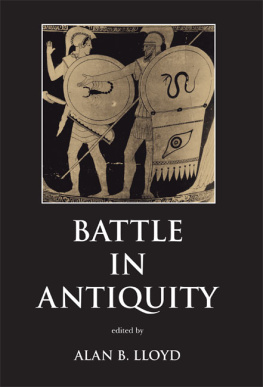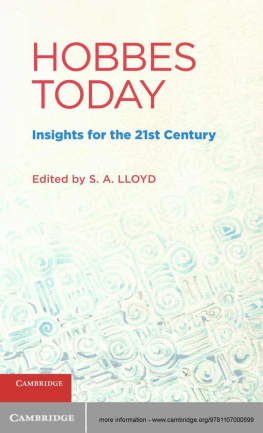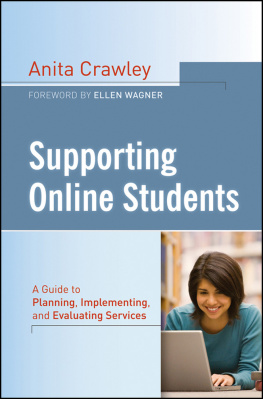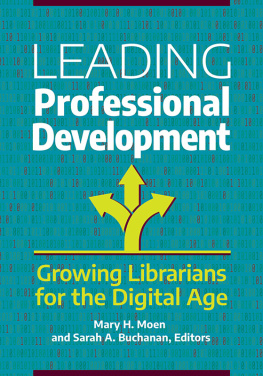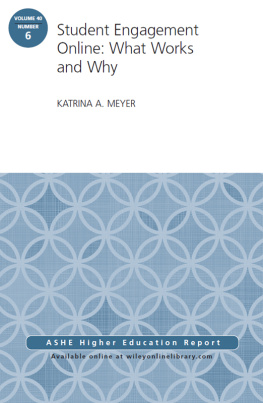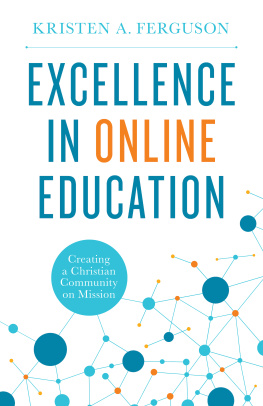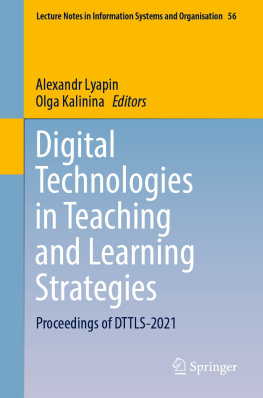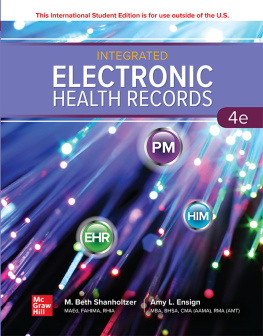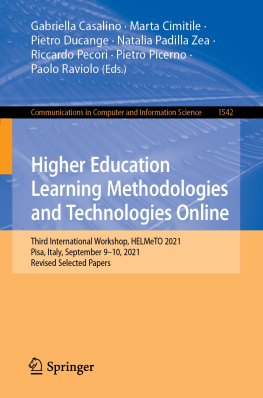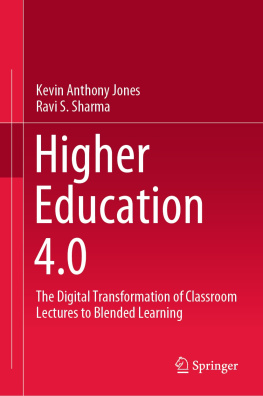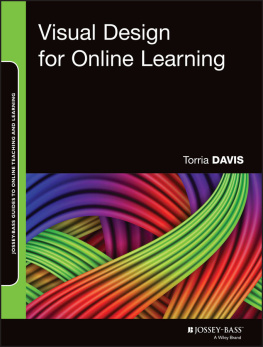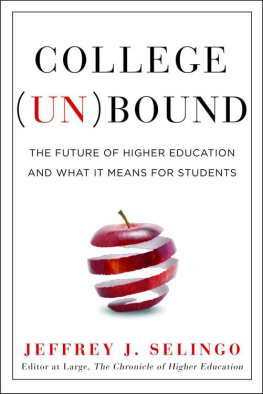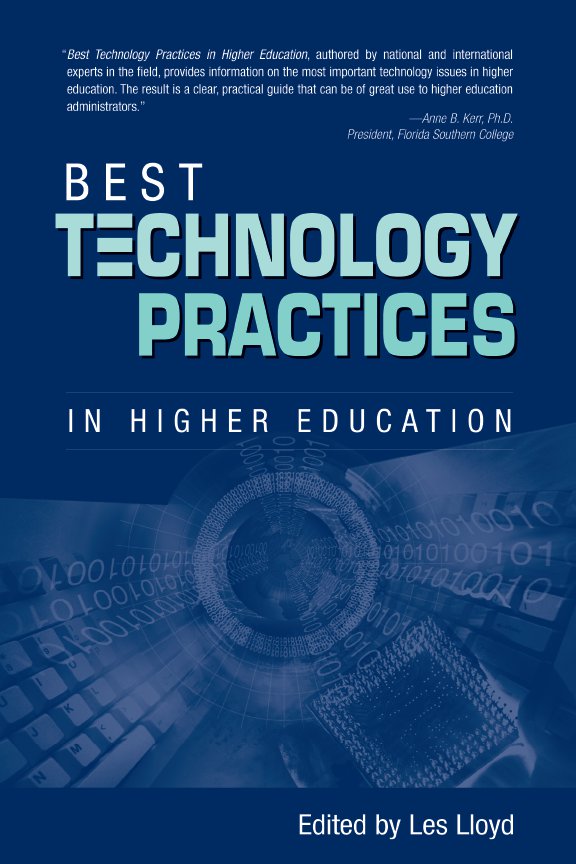
First printing, 2005
Best Technology Practices in Higher Education
Copyright 2005 by Les Lloyd
All rights reserved. No part of this book may be reproduced in any form or by any electronic or mechanical means, including information storage and retrieval systems, without permission in writing from the publisher, except by a reviewer, who may quote brief passages in a review. Published by Information Today, Inc., 143 Old Marlton Pike, Medford, New Jersey 08055.
Publishers Note: The author and publisher have taken care in preparation of this book but make no expressed or implied warranty of any kind and assume no responsibility for errors or omissions. No liability is assumed for incidental or consequential damages in connection with or arising out of the use of the information or programs contained herein.
Many of the designations used by manufacturers and sellers to distinguish their products are claimed as trademarks. Where those designations appear in this book and Information Today, Inc. was aware of a trademark claim, the designations have been printed with initial capital letters.
Library of Congress Cataloging-in-Publication Data
Best technology practices in higher education / edited by Les Lloyd.
p. cm.
Includes bibliographical references.
ISBN 1-57387-208-3 (pbk.)
1. Education, Higher--Computer-assisted instruction. 2. Education, Higher--Effect of technological innovations on. 3. Information technology. 4. Educational technology. I. Lloyd, Les.
LB2395.7.B48 2004
378.1734--dc22
2004009778
Publisher: Thomas H. Hogan, Sr.
Editor-in-Chief: John B. Bryans
Managing Editors: Deborah R. Poulson, Amy M. Holmes
Graphics Department Director: M. Heide Dengler
Copy Editor: Pat Hadley-Miller
Book Designer: Kara Mia Jalkowski
Cover Designer: Michele Quinn
Indexer: Sharon Hughes
For a complete catalog, contact:
Information Today, Inc.
143 Old Marlton Pike, Medford, NJ 08055 609/654-6266
email:
Best Technology
Practices in
Higher Education
This book is dedicated to Dr. Rita Bornstein, former President of Rollins College, whose leadership inspired us. Dr. Bornstein came to Rollins in 1990 when it was known as a nice, small, Florida school. During her 14-year tenure, she raised money, built buildings, added and strengthened programs and, most importantly, set out to make Rollins the number one college of choice for incoming students. Her legacy, aside from the transformation of the campus, is of a college on the move with 30 percent more students, a nine-fold increase in endowment, a national reputation, and the pride felt by students, faculty, and staff who see how far weve come and how much we can achieve together. It has been an honor to serve under her leadership.
Information technology has profoundly impacted colleges and universities. However, the remarkable benefits of rapid information transfer often seem offset by the rapid pace of technological advances. In this atmosphere, decision-making with regard to technology has major budget and operation implications.
Best Technology Practices in Higher Education, authored by national and international experts in the field, provides information on the most important technology issues in higher education. The result is a clear, practical guide that can be of great use to higher education administrators.
Les Lloyd, associate vice-president for Information Technology at Rollins College, deserves high praise for the conception, development, and coordination of the original symposium that served as the basis for this volume, and for his judicious editing of these proceedings. His efforts provide us with an admirable model of how higher education administrators, in the course of their specific professional responsibilities, can at the same time continue to serve as model teachers and scholars.
Anne B. Kerr, Ph.D.
President, Florida Southern College
Many management courses use case studies as a means to teach the right and wrong way to handle specific situations. Given the same problem, though, six people could reasonably come up with different solutions that all worked as needed. So, although the Best Practices presented here are meant to showcase solutions, they are by no means the only way these problems could have been addressed. The authors and I did use as a guiding principle, though, that these projects could be easily replicated at many other schools, and that the costs of implementation wouldnt render any project financially unfeasible. Our definition of best practices is: proven solutions to common problems that are available to institutions for adoption regardless of the hardware or software used.
In planning to teach the course Management of Communication Technology in our Masters of Corporate Communication and Technology graduate program, it struck me that it was going to be very difficult to teach a course on what I do every day. How could I present the vast array of options and solutions to students with a wide range of technical skills and interests? Clearly, trying to condense 20-plus years of making decisions, right or wrong, into a semester-long course was going to be a real challenge.
So, we come back to case studies to demonstrate a specific set of variables that led to a problem, show the resources available to deal with the problem, and then let the reader work through solutions. One can never present all the possible permutations of problems that occur daily; what we can teach, though, is a method of problem solving that should yield positive results most of the time, which is the reason for putting together a volume like this.
You wont have the same set of problems illustrated here, but you may have similar ones. You may find a solution that can work for you, or an idea, or make the acquaintance of someone who can help you work through your own complicated set of variables. The topics included in this work are illustrative of the variety of issues that face the information technology industry in general, and IT on college campuses specifically. Some of the projects are major; others are modest. Hopefully, youll discover at least one that solves a problem, suggests a useful new service, or sparks a winning idea.
It is not my intention to present a comprehensive set of best practices in this booka volume like that might be impossible to create. However, there are other best practices that I thought would be worth mentioning, for those that are new to the field or looking for more examples. These include:
Information technology organization: Much has been written in recent years about to whom the chief technology officer should report: the president, the chief academic officer, or the chief administrative officer. Depending on politics, this can be a major issue related to the funding and importance of IT in the organization, or it can be a nonissue. The key is that IT report to an influential person who can represent the technology needs of the institution to whoever makes the final budget and policy decisions. Whether this is a provost influencing a president or a president influencing a board of trustees is unimportant. This is the reason why there is no standard reporting structure for Chief Information Officers (CIOs).
Selecting administrative software: Just about every college that hasnt converted its administrative software system to one of the market leaders will do so in the next few years. The advantages of having built-in Web functionality alone justify the cost of the project for most schools. Administrative software has followed the trend of library packages; 20 years ago there were many vendors and products. Today there are a few, and virtually every college, except some major research institutions, owns one of these packages. The fallout on the administrative software side has been similar, with SCTs Banner seemingly dominating the market and many smaller vendors falling by the wayside. Oracles announcement of its intention to purchase PeopleSoft, SCTs only significant competitor at this time, demonstrates how fast the market situation can change. Most colleges have learned that they cant write software in-house thats flexible to meet changes, that can withstand the constant turnover of programmers, and that can compete functionally with these major market packages.


